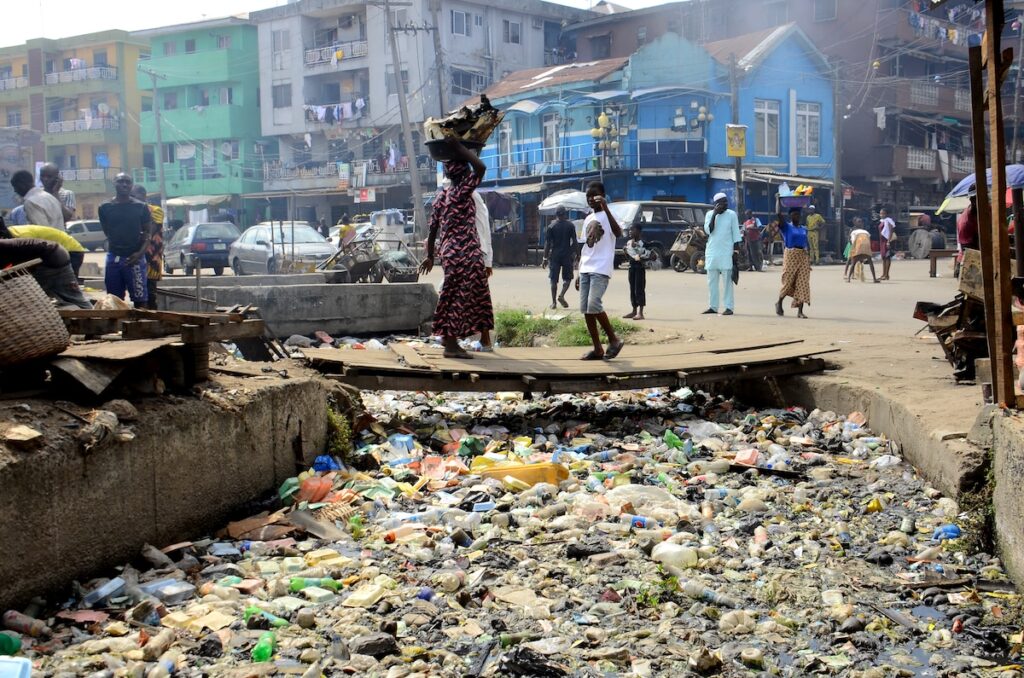Nigeria’s Lagos State Bans Single-Use Plastics and Styrofoam
3 min read
People walk past a drainage channel blocked with bottles and styrofoam food containers along Adeniji Adele on Lagos-Island in Lagos, Nigeria on Aug. 24, 2020. Olukayode Jaiyeola / NurPhoto via Getty Images
Why you can trust us
Founded in 2005 as an Ohio-based environmental newspaper, EcoWatch is a digital platform dedicated to publishing quality, science-based content on environmental issues, causes, and solutions.
Lagos State, which includes Nigeria’s most populous city of 15.4 million, has announced a ban on single-use plastics and styrofoam in order to reduce the plastic pollution that chokes the region.
The ban would be immediate, according to a statement from the state government, but enforcement and implementation would not be so straightforward, environmental experts said, as AFP reported.
“Following the menace which single-use plastics especially non-biodegradable Styrofoam are causing on the environment, the Lagos State government through the Ministry of the Environment and Water Resources is hereby announcing a ban on the usage and distribution of Styrofoam and other single-use plastics in the State with immediate effect,” Tokunbo Wahab, the state’s environment and water resources commissioner, said on social media.
Styrofoam is widely used in food service and delivery by markets and street vendors in Lagos, but it and other packaging build up in the area’s drains and roads, reported AFP.
The new measure received praise from some, while others wondered what alternatives there would be for merchants and manufacturers.
“Our state cannot be held hostage to the economic interests of a few wealthy business owners compared to the millions of Lagosians suffering the consequences of indiscriminate dumping of single use plastics and other types of waste,” Wahab said, as Business Day reported.
Climate and Ecological Protection Initiative co-founder Folawemi Umunna said correct implementation of the ban was key.
“This is wonderful news for the environment on different levels and if this is effectively executed, capable of reducing a substantial amount of CO2 emissions in tonnes in the Lagos State perimeter,” Umunna said, as reported by AFP.
According to the United Nations Environment Programme, each year the planet’s rivers, lakes and oceans are polluted with 21 to 25 million tons of plastic trash.
Other African countries like Tanzania, Botswana, Mali, Ethiopia, Kenya, Mali, Malawi, Cameroon, Morocco, Uganda, Rwanda, Botswana and South Africa have either banned single-use plastics or placed a high tax on them, Times of India said.
Tanzania prohibits travelers from bringing plastic bags of any thickness into the country. The exception is bags that zip shut used to carry toiletries, as long as they are not disposed of there. Visitors to Tanzania are encouraged to use cloth bags.
“The convenience of single use plastic comes at a huge cost to the society. We must all make small sacrifices for our collective well-being,” Wahab said, as Business Day reported.
Subscribe to get exclusive updates in our daily newsletter!
By signing up, you agree to the Terms of Use and Privacy Policy & to receive electronic communications from EcoWatch Media Group, which may include marketing promotions, advertisements and sponsored content.





